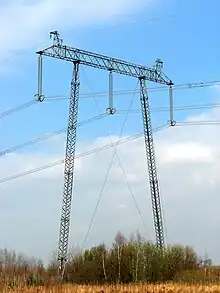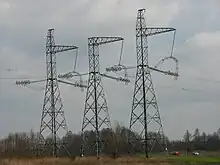Rzeszów–Khmelnytskyi powerline
The Rzeszów–Khmelnytskyi powerline is an electrical power transmission line between Ukraine and Poland. It is the only 750 kV-powerline in Poland and one of the few of it in the European Union of this type.
| Rzeszów–Khmelnytskyi powerline | |
|---|---|
 pole-through 750 kV line from the Ukrainian nuclear power plant Khmelnitsky station 750/400 kV Widełka near Kolbuszowa. The photograph was taken near the intersection line with the national road DK19 in Nienadówce, at its border with Stobierna and Medynia Głogowska. | |
| Location | |
| Country | Poland, Ukraine |
| General direction | west–east |
| From | Widełka substation, Poland 50°11′49″N 21°52′19″E |
| Passes through | Border between Poland and Ukraine 50°6′2″N 23°17′28.2″E |
| To | Khmelnytskyi Nuclear Power Plant 50°18′5.06″N 26°38′59.10″E |
| Construction information | |
| Commissioned | 1985 |
| Decommissioned | 1993 |
| Technical information | |
| Type | Overhead transmission line |
| Type of current | AC |
| Total length | 395 km (245 mi) |
| AC voltage | 750 kV |
| No. of circuits | 1 |

History
The decision to build this powerline was made in 1977 and it went in operation in 1985.[1] The line went out of service after Poland joined the synchronous grid of Continental Europe (UCTE).[2] However, there was a plan to re-activate this line after 2010 by constructing a back-to-back conversion station on the Polish end of the line, but this was not implemented.[3]
In 2016 Energoatom announced it was considering disconnecting unit 2 of the Khmelnytskyi Nuclear Power Plant from the Ukrainian power grid and using the powerline to connect to the Burshtyn TES energy island which operates on the European power grid, to facilitate exports to Poland and Hungary.[4][5] In 2019 the Ministry of Energy created a consortium, Ukraine Power Bridge Company Limited, to progress the project, but as of 2020 the project was not agreed.[6]
Technical description
It has a length of 395 kilometres (245 mi), of which 281 km (175 mi) in Ukraine and 114 km (71 mi) in Poland.[1] It runs from Widełka substation near Rzeszów in Poland to Khmelnytskyi Nuclear Power Plant in Ukraine. It is an AC line and has a single circuit. It can transfer a maximum power of 1300 MVA.
As guyed portal pylons are used, strainers are from special design. They consist of three free-standing lattice towers each carrying one conductor. Each strainer tower has a crossbar at which the conductor is led around the structure on a huge insulator.
The line crosses at 50°3′24″N 25°22′5″E the 750 kV powerline from Zakhidnoukrainska Substation to Rivne Nuclear Power Plant, which may be the only crossing of two 750 kV powerlines in Europe.
References
-
Klukowski, Przemysław; Krysiak, Jarosław. "Budowa i eksplotacja ukladu przesylowego 750 kV" (PDF) (in Polish). Retrieved 2008-12-23.
{{cite journal}}: Cite journal requires|journal=(help) -
"Activity Report 2007". The President of the Enenergy Regulatory Office in Poland. 2007-10-31: 52. Archived from the original (PDF) on 3 March 2016. Retrieved 10 March 2017.
{{cite journal}}: Cite journal requires|journal=(help) -
"European, CIS and Mediterranean Interconnection: State of Play 2006. 3rd SYSTINT Report" (PDF). EURELECTRIC, UCTE. January 2007: 52. 2007-030-0428. Retrieved 10 November 2010.
{{cite journal}}: Cite journal requires|journal=(help) - Alexander Bor (27 May 2016). "Ukraine to build power line for power exports to Poland, Hungary: EnergoAtom". Platts. Archived from the original on 28 May 2016. Retrieved 10 March 2017.
- "Energoatom awaits approval for energy bridge tender". World Nuclear News. 18 April 2018. Retrieved 18 April 2018.
- "Energy Bridge has geopolitical significance, says Polenergia". World Nuclear News. 4 December 2020. Retrieved 7 December 2020.